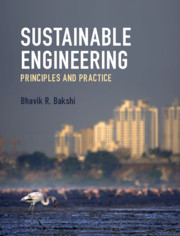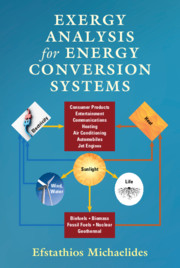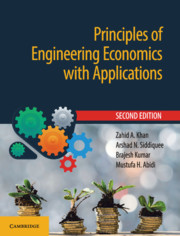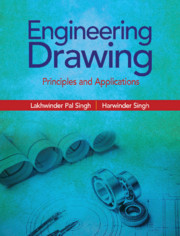Sustainable Engineering
Principles and Practice
$99.99 ( ) USD
- Author: Bhavik R. Bakshi, Ohio State University
- Date Published: June 2019
- availability: This ISBN is for an eBook version which is distributed on our behalf by a third party.
- format: Adobe eBook Reader
- isbn: 9781108359429
Find out more about Cambridge eBooks
$
99.99 USD
( )
Adobe eBook Reader
Other available formats:
Hardback
Looking for an examination copy?
If you are interested in the title for your course we can consider offering an examination copy. To register your interest please contact [email protected] providing details of the course you are teaching.
-
Drawing on multidisciplinary perspectives from engineering, economics, business, science, and human behavior, this text presents an unrivalled introduction to how engineering practice can contribute to sustainable development. Varied approaches for assessing the sustainability of engineering and other human activities are presented in detail, and potential solutions to meet key challenges are proposed, with an emphasis on those that require engineering skills. Each concept and approach is supported by mathematical representation, solved problems, real-world examples, and self-study exercises. Topics covered range from introductory material on the nature of sustainability, to more advanced approaches for assessment and design. Prerequisites for each chapter are clearly explained so the text can be adapted to meet the needs of students from a range of backgrounds. Software tutorials, project statements and solutions, lecture slides, and a solutions manual accompany the book online, making this an invaluable resource for courses in sustainable engineering, as well as a useful reference for industry practitioners.
Read more- Has multidisciplinary appeal, with perspectives from engineering, economics and the social sciences
- Adaptable to students from a range of backgrounds, covering both introductory as well as mathematically rigorous advanced topics
- Benefits from nearly 100 worked examples and over 200 end-of-chapter exercises
Reviews & endorsements
'This book addresses such critical topics as life-cycle assessment, energy and material flows, exergy, sustainability assessment, engineering design, industrial symbiosis, and circular economy. The author utilizes various case studies/examples, such as the case of genetically modified organisms (GMOs) and the lessons from Easter Island. There are flowcharts and solved quantitative examples that make the introduced concepts less abstract. Each chapter is followed by exercises, making it easier to use for academic purpose / course assessment. I believe this text will be useful for advanced undergraduate or graduate-level college students, and that it is successful in its goal to rigorously address the role of engineering with respect to environmental sustainability, and to help engineers understand sustainability.' John W. Sutherland, Fehsenfeld Family Head of Environmental and Ecological Engineering, Purdue University
See more reviews'In Sustainable Engineering, Bhavik R. Bakshi demonstrates that engineers and conservationists can be important allies. Using a variety of real-world examples and detailed case studies, Bakshi makes the case that engineering practices can lead to a sustainable future.' Mark R. Tercek, CEO of The Nature Conservancy and author of Nature’s Fortune: How Business and Society Thrive by Investing in Nature
'Sustainable Engineering provides a comprehensive engineering treatment of sustainability. This is the only textbook covering many of the new approaches to sustainable engineering. Clear, succinct chapters, and the range of quantitative problems, make for a welcome textbook that will be widely useful for undergraduate engineering classes. It includes recent concepts such as water footprinting, energy return on investment, material flow analysis, energy analysis, ecosystem services calculations, techno-economic analysis, and industrial symbiosis. The problems are quantitative and thorough, with sufficient worked examples that they can be mastered in an introductory sustainable engineering course. The sustainability framing is broad and thorough, allowing undergraduates to see the big-picture context for sustainable engineering. References are also excellent, encouraging students to become familiar with key data sources, software, and the relevant scientific literature.' Valerie Thomas, Anderson Interface Professor of Natural Systems, Georgia Institute of Technology
Customer reviews
Not yet reviewed
Be the first to review
Review was not posted due to profanity
×Product details
- Date Published: June 2019
- format: Adobe eBook Reader
- isbn: 9781108359429
- contains: 187 b/w illus. 87 tables 110 exercises
- availability: This ISBN is for an eBook version which is distributed on our behalf by a third party.
Table of Contents
Part I. Introduction and Motivation:
1. The basis of human well-being
2. Status of ecosystem goods and services
3. Sustainability: definitions and challenges
Part II. Reasons for Unsustainability:
4. Economics and the environment
5. Business and the environment
6. Science, engineering, and the environment
7. Society and the environment
Part III. Sustainability Assessment:
8. Goal definition and scope
9. Inventory analysis
10. Mathematical framework
11. Footprint assessment
12. Energy and material flow analysis
13. Exergy analysis
14. Cumulative exergy consumption and emergy analysis
15. Life cycle impact assessment
16. Ecosystem services in sustainability impact assessment
Part IV. Solutions for Sustainability:
17. Designing sustainable processes and products
18. Ecosystem ecology
19. Industrial symbiosis and circular economy
20. Ecosystems in engineering
21. Economic policies
22. Societal development.
Sorry, this resource is locked
Please register or sign in to request access. If you are having problems accessing these resources please email [email protected]
Register Sign in» Proceed
You are now leaving the Cambridge University Press website. Your eBook purchase and download will be completed by our partner www.ebooks.com. Please see the permission section of the www.ebooks.com catalogue page for details of the print & copy limits on our eBooks.
Continue ×Are you sure you want to delete your account?
This cannot be undone.
Thank you for your feedback which will help us improve our service.
If you requested a response, we will make sure to get back to you shortly.
×






